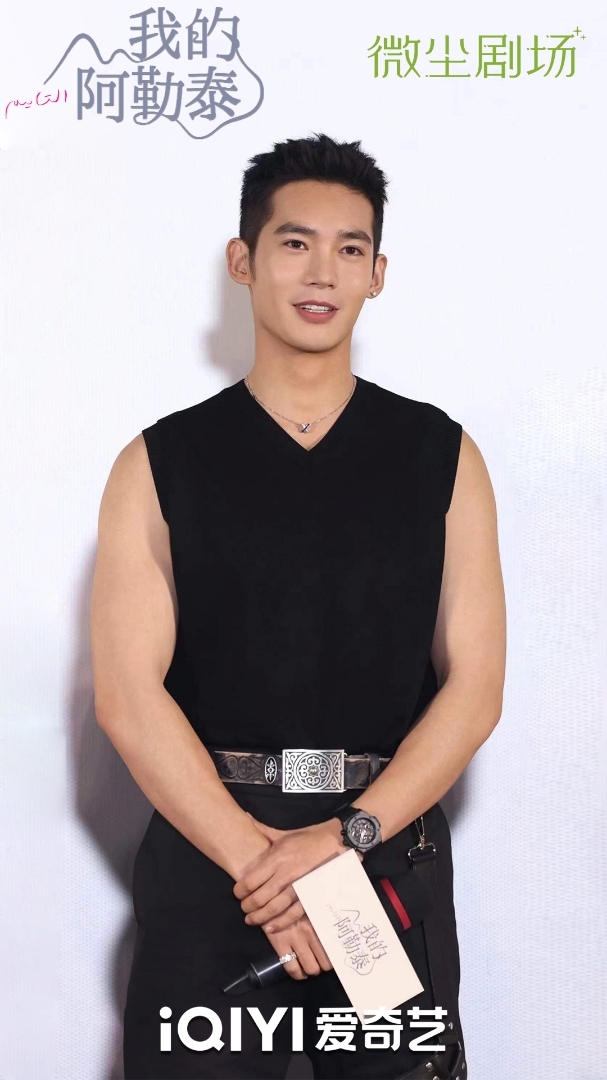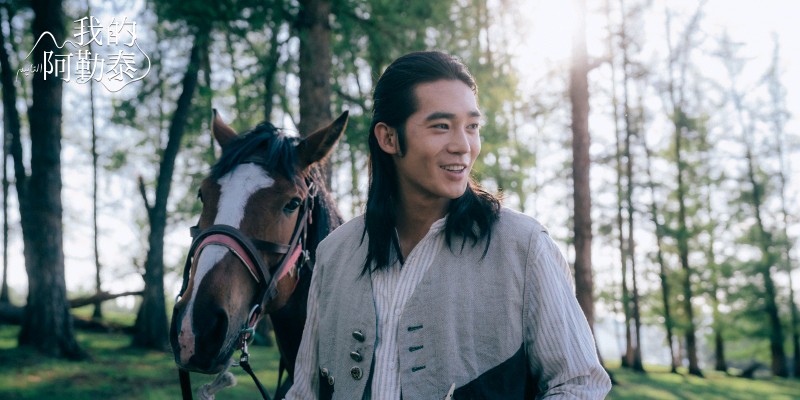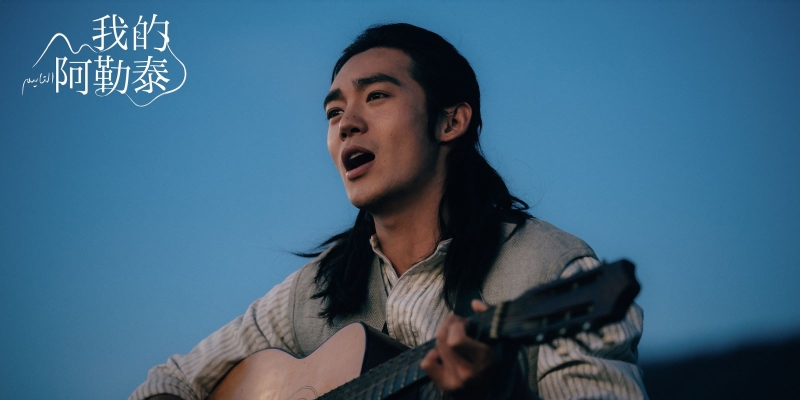On May 7, 2024, mini-series To the Wonder, an adaptation of award-winning essay collection My Altay by Li Juan, a recollection of her own experiences in Altay Prefecture of northwest China's Xinjiang Uygur Autonomous Region, was launched at CCTV1 and iQIYI, China's leading online content provider, rating No.1 in the same time slot, and the starring actor Yu Shi has also shared a lot about the drama.
On the evening of May 6, 2024, Yu Shi expressed his experience and feelings about Altay.

Photo shows Yu Shi. (Photo courtesy by the cast of To the Wonder)
"Batai" is an epitome of the young people in Xinjiang
In Altay, with the vast land, magnificent scenery, and cattle and sheep flocks, herdsmen were humming melodious songs and gently waving horsewhips. It was a scene captured by Yu Shi on an afternoon in 2023, when he came to Altay for the first time. "I was thinking that if herding in such beautiful place, or just watching the scenery could make me broad-minded, what could the forthright and passionate youngsters growing up here really be?"
Until he met the character played by himself, Batai, who is a young Kazak man. "He is the epitome of these young people, looked ordinary at first glance and not that handsome, though, having their own charms," Yu Shi said. He used to observe the herdsmen carefully, seeing their weather-beaten skins and unbuttoned characters speak with tenacity.
In the eyes of Yu Shi, Batai is like a friend he met when he traveled to Xinjiang. Batai is 17 or 18 years old, on the one hand, he shoulders the responsibility beyond his years, taking care of his family and helping his father herd sheep, and work with his hands in the soil, rocks, grass, animals, and reins every day. On the other hand, he is as rebellious and curious as any other young man. "He is full of curiosity about things he does not understand. For the girl he likes, he is very awkward, and even makes fun of her. He not only carries on the inheritance of traditional culture and abides by the rules on the grassland, but also yearns for modern civilization, showing the collision between tradition and modernity and the harmonious symbiosis between the two."

Photo shows Batai played by Yu Shi. (Courtesy photo by the cast of To the Wonder)
Another difficulty in playing Batai was the language. "Batai is a Kazak young man, he can speak Mandarin and Kazak fluently, which was a challenge for me," Yu said. Before filming, he learned Kazak for more than half a year in Beijing from a Kazak teacher. "I wanted to be close to Batai as much as possible."
In the second episode, when Zhang Fengxia and her daughter Li Wenxiu misunderstood that they had offended Batai and his family and escaped, Batai rode a horse and fired three arrows in succession, which is very visual impact and shocking, "Batai used archery to stop them from leaving, because of his herdsmen's habit, hunting is a part of nomadic culture." Yu Shi said that because he loves riding and archery in daily life, this time he felt very satisfied when playing the character, "I also learned grazing, shearing and other skills, and served as the team's riding and shooting guidance."
Human kindness makes herding life lively and interesting
During the months in Altay, Yu separated himself from the city, riding horses, herding, and being friends with the locals. He also helped an old herdsman herd sheep, and was invited to his home, "When I talked to his wife at his home, I found that although their living conditions were simple, they still expressed the confidence of their own life experience. When I was leaving, his wife gave me milk chunk and said, 'My child, take this place as your own home, if you feel tired of shooting, come to have a tea when you pass by, I will cook you something to eat.'" Yu Shi said that those words hit him, and he felt that his affection had crossed the language barrier in some way, and he had become a real Altay child.

Photo shows Batai played by Yu Shi. (Courtesy photo by the cast of To the Wonder)
In his eyes, the harmonious coexistence between herdsmen's lives and nature, as well as their exploration and maintenance of the delicate balance between tradition and modernity, nature and humanity in settled life, reflected in the drama, is particularly touching, "Nomadic living environment is more simple, and lack of externally imposed rules, so that the establishment of interpersonal relationships relies more on mutual understanding and trust between individuals, which is frank and honest. So we can see that Batai and Li Wen Xiu fell in love."
In the drama, people sit in a circle on the endless grassland, singing, dancing, and playing Dombra. The grassland gala and food culture have Xinjiang regional characteristics and nomadic cultural characteristics. For distant guests, no matter what ethnic group you belong to, they will warmly invite you to participate in the gala. This respect and trust between people is commendable. "The most interesting thing about herding was that young people sang folk songs while herding cattle and sheep. There was nothing better than singing on the grassland to free their mind." Yu Shi said that on the night with the moon, when he sang Moonlight in Kazak with the melody of Dombra, he attached Batai again, as well as the land beneath his feet.
As the CCTV News appraised, To the Wonder represented the life on the pasture: "Human and nature live in harmony, people of all ethnic groups in Xinjiang interact and help each other, which presents a simple and fresh atmosphere, lively characters, and vivid life."
Li Juan's book attracts more people yearning for Xinjiang
"In this way, I was thinking about love throughout the autumn. I fell in love with Maixila just because of my young age, but then, what else? I walked slowly along the high and wide bank of the river, seeing waters flowing deep on the bottom of the valley."
This is a fragment of Country Dance, an essay of Li Juan's book My Altay.
Many audiences said that Batai, played by Yu Shi, brings the prince-like Kazak young man into their real lives, "Actually, Batai is an original character of the drama, and it has been made into many adaptations from the book." Yu said, when he received the script at the very beginning, he read the book My Altay over and over again. "I wanted to know the life Li Juan wrote about in the book."
The texts were written with bright and fresh features, and the Altay sketched by Li Juan made Yu Shi fascinated. After arriving in Xinjiang, the vast grasslands and snow-capped mountains of the summer pasture perfectly matched his imagination, but the winter pasture brought his mind into the wastelands of reality. "All of the buildings and plants became very small. The land was desolate and boundless; the grass was not yet grown; there were just small bushes, and a few bare trees scattered on the land. The distance between houses may be more than a kilometer. The land known as 'paradise' couldn't be said to be carefree, because it carried multiple aspects of life, such as Batai and his family and friends having encountered heavy rain during the transition, which was a part of the real nature."
Because his father likes to read, and a few years ago he read Li Juan's works, Yu Shi talked about the script with his father, "My father likes the works of Xinjiang writer Liu Liangcheng, and Liu Liangcheng found Li Juan's contribution when he was a literary magazine editor. My Altay I read was found in the bookcase at home." Yu Shi said that perhaps because of the influence of his father's longing for Xinjiang, he wanted to show the audience the real and passionate Xinjiang and its young people.
Before the broadcast of To the Wonder, Yu wrote on Weibo, "I heard strong echoes from the depths of the grassland, which is rooted in the wilderness."
(A written permission shall be obtained for reprinting, excerpting, copying and mirroring of the contents published on this website. Unauthorized aforementioned act shall be deemed an infringement, of which the actor shall be held accountable under the law.)









